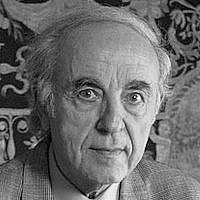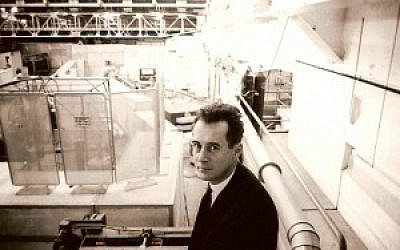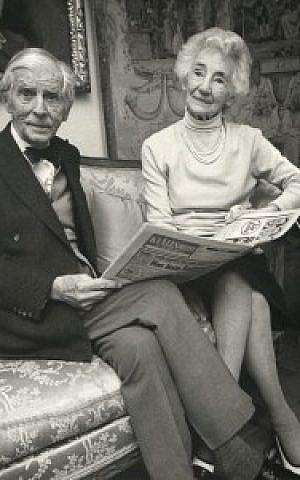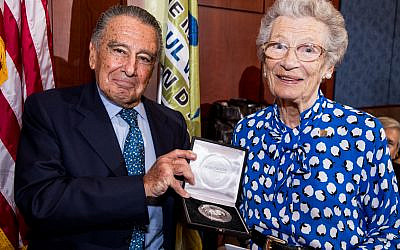

Raoul Wallenberg – 77 years without closure
Raoul Wallenberg, at the University of Michigan
Photo: University of Michigan Heritage Project
Raoul Wallenberg was a singular hero who lived a short but remarkable life. In a 6-month period, which started on July 9, 1944, he managed to save the lives of tens of thousands of Hungarian Jews. By so doing, he risked his life enormously, becoming a target of the Germans and their Hungarian henchmen. Quite ironically, though, after achieving his humanitarian feat, he fell victim to another despotic regime that not only imprisoned him but also most likely ended his life shortly afterward.
I think of him every single day, but especially so on his birthday – August 4 – and on the day of his disappearance – January 17, when he was literally abducted by the Soviet military-intelligence apparatus.
Today, we are marking the 77 anniversary of the day when his tracks were lost.
A lot has been written about Wallenberg, including in my blogs of last year, on the occasion of his 109th birthday and the 76 anniversary of his abduction.
To be sure, his awe-inspiring deeds were depicted in all those texts. This time I would like to focus not on his heroism and tragic fate, but on the unspeakable suffering of his closest relatives.
Raoul was born into one of the most powerful families in Sweden, and perhaps in all Europe. Even nowadays, the Wallenberg economic group still retains this status.
His father, also name Raoul, was a Swedish naval officer who succumbed to cancer before Raoul was born. His mother, Maj, re-married Fredrik von-Dardel, who became a fatherly figure to little Raoul. His half-siblings, Guy and Nina, absolutely admired their elder brother.
Many decades after Raoul’s tragic disappearance I befriended Prof. Guy von-Dardel (an eminent physicist), his wife Mati, and their two daughters, Louise and Marie. Later I got to know Nina Lagergren and two of her children, Nane (the widow of the late UN Secretary-General Kofi Annan) and Bengt, as well as some of Nina’s grandchildren.
In sharp contrast with Raoul’s powerful relatives from his father side, the Wallenberg family, led at that time by Marcus and Jacob, and even their descendants, who showed little interest in Raoul’s fate following his disappearance, those from the side of his mother and stepfather dedicated their lives to try to bring Raoul back home.
Until his very death in 2009, Prof. von-Dardel worked indefatigably to secure leads regarding Raoul’s fate and whereabouts. During his lifetime, he compiled a massive archive on his half-brother and was a member of several commissions, which dealt with his imprisonment. I had the privilege of meeting him on several occasions and despite his anguish, his optimism was contagious. He firmly believed that he would be able to bring closure to this tragic story. Unfortunately, he passed away in 2009, without realizing his lifelong dream.

Prof. Guy von-Dardel
Photo: Les Sirman Press
Raoul’s mother, Maj, and his stepfather, Fredrik, also devoted the last three decades of their lives campaigning for their son’s return. Broken by the Soviet’s web of lies and the indifference and incompetence of the successive Swedish governments and the coldness of the Wallenberg family, the couple decided to put an end to their suffering and committed suicide in 1979, within a few days apart.

Fredrik and Maj von-Dardel (1975)
Photo: Expressen
Nina Lagergren was a modest and soft-spoken woman. Her stance was less belligerent than that of Guy’s, but her suffering was quite as intense.
My only meeting with her took place in Washington, in July 2014, on the occasion of the posthumous bestowal of the Congressional Gold Medal to Raoul Wallenberg.

Nina Lagergren with Eduardo Eurnekian
US Congress – July 9th, 2014
Photo credit: Dani Tenenbaum
Prior to the solemn ceremony that took place at the US Capitol Rotunda, Eduardo Eurnekian, Chairman of the International Raoul Wallenberg Foundation and I held a moving meeting with this charming lady. She expressed her gratitude for everything our NGO had done to pay tribute to Raoul and confided to us that her dream was to bring his remains back home, to rest next to her beloved parents. Nina passed away in 2019, aged 98, and despite her long life, like her brother Guy, she was not able to see her dream come true.
Raoul Wallenberg was a larger-than-life hero. The lives and deeds of his closest relatives show how deeply he was loved and cherished.
The International Raoul Wallenberg will continue its quest to keep his blessed legacy alive and at the same time secure credible answers regarding his fate and whereabouts. We owe this debt not only to Raoul, but also to his late mother, stepfather, half-siblings, nephews, and nieces.
